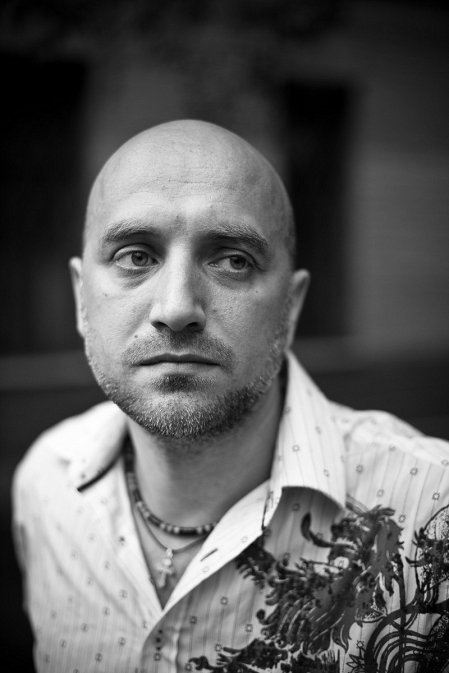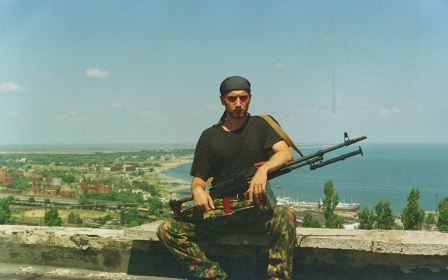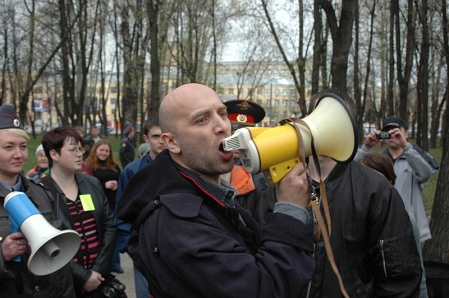Erstellt am: 11. 4. 2013 - 14:16 Uhr
The Chronicler of Russia's "Lost Generation"
The new darling of Russia`s literary scene, Zahar Prilepin, is a muscular, shaven-headed former special police force officer who served in two Chechen wars, belongs to a banned nationalist-leaning Russian political movement and bemoans the "political correctness of west European society."
I must have looked unimpressed when the 37-year old arrived at the FM4 studios in a hoody and beanie hat because his press agent quickly assured me that Prilepin`s "a real superstar in Russia." It`s true. Prilepin writes novels and short stories that sell like hot-cakes in Russia and are received with general critical acclaim. Newsweek has called him "probably the most important writer in modern Russia" and his face is plastered all over bookshops and advertising hoardings in Moscow. His stories feature hard-boiled characters such as a traumatised soldier in Chechnya or an alcoholic`s son looking for personal redemption in radical politics. With the stories' emphasis on toughness and male friendship, it is not surprising that Western reviewers have likened Prilepin`s writing to that of Ernest Hemingway, an author Prilepin admires.

Zahar Prilepin
Hemingway`s best work was as the chronicler of what Gertrude Stein famously described as the post-World War 1 ‘lost generation’ - young Western men (and it was mostly men) who had lost any sense of structure and traditional values after the cataclysm of the war and, drinking and brawling their way through life, were tossed around in a stormy sea of freedom and doubt. Perhaps the collapse of the Soviet Union had the same impact on Prilepin?
He was 16 years old when the Soviet Union collapsed in 1991, and from that moment on there seemed to be constant conflict on the edges of the former Russian empire, in North Ossetia, Transnistria, Abkhazia, Chechnya, and Georgia. In 1994 he was drafted into the Russian army. "I could dream of peace, but what else could I do? War was the reality. I had to develop a relationship with this reality. It probably would have been very different if I`d lived in a country where everything had been peaceful for 60 or 70 years."
In the spirit of Hemingway`s Men Without Women, Prilepin describes Pathologies, his first novel to be translated into English, as the story of "male friendship in an extreme environment." He adds that there is a great history of war veterans becoming writers in Russia. "Tolstoy was also a soldier in the Caucasus before he began writing. Of course that formed him as a person and as a writer."

Zahr Prilepin
Prilepin is uncomfortable talking about his experience of war in Europe. "In the 20th century, after Hemingway, a real pacifist sentiment developed, for obvious reasons, in society at large but also in literary circles. It is not just pacifist but incredibly politically correct." He tells me that it led him to cause a minor scandal on French radio. An interviewer that asked him how he had remained sane amid the brutality of Chechnya and, in a provocative mood, he answered that Russians "enjoyed fighting wars".
It is not true, he tells me, chuckling, but the hypocrisy of it all annoys him:
"We pretend there is no aggression, that we don`t have macho urges, that none of these things exist. And yet countries are invaded and regimes are changed while we preach peace." He argues that Tolstoy and Dostojevsky were politically incorrect authors in their time, and that is why they interest him: "These were writers who showed that they were free."
It is hard to work out what to make of Zakhar Prilepin. He`s an admirer of the murdered investigative journalist Ana Politkovskaya, and contributes to the Nizhni Novgorod edition of the investigative Novaya Gazeta weekly newspaper where she made her name. Liberal opponents of Vladimir Putin admire Prilepin for his pugilistic and outspoken criticism of the Russian President, but, although his most enthusiastic readers tend to be the educated young urbanites, some of his more nationalist views are likely to offend sensibilities here in central Europe:
Railing against the drop in Russia`s birth rate he told me that Russia was at risk of "dying out." He told Newsweek`s Anna Nemsova that "Men are designed to deal with war like women are designed to overcome childbirth." An unabashed patriot, he says that with its natural resources Russia`s future would be much brighter were it not for what he sees as Putin's mismanagement.
From a central European perspective, you don`t get much more politically incorrect than the National Bolshevik Movement of which Prilepin is a prominent member. According to Wikipedia, although it has repudiated racism and xenophobia, the NBM, which was officially banned for being extremist in 2007, has "advocated the creation of a Russian-dominated empire that would include all of Europe" and has rallied in support of Serbian war crimes suspect Radko Mladic. He says that he has been arrested dozens of times, but complains that because of his cultural prominence he is treated with kid-gloves alone in a police van while his fellow protesters are brutally pinned to the ground.

Zahar Prilepin
His novel "Sankya" is clearly forged by this experience. It`s the story of an impressionable young man, Sasha Tishin, who becomes member of revolutionary organization, similar to National Bolshevik Party, and falls under the spell of its charismatic leader, Sankya. I ask Prilepin what has shaped his political views, "I live in a country that is being exploited and destroyed," he says. "I have four children growing up in a country that is dying because the regime is robbing all the natural riches for the benefit of a tiny elite." He says he has watched these riches disappear into Cypriot bank accounts, London football clubs and the purchase of giant yachts, and he blames Putin for encouraging this culture.
So he is a literary "enfant terrible" the Russian urban intelligentsia don`t seem to even find particularly terrible. "Welcome to Russia!" says FM4`s Moscow correspondent Charles Maynes, who has met Prilepin several times, and describes him as a mercurial figure: "He`s sort of a punk poet." For Russians part of his appeal lies in the very vehemence of his views. "This is a country," says Maynes, "where political correctness is scorned." And for many in the liberal opposition, who are drawn by Prilepin`s charisma, any enemy of Putin is a natural friend.
His novels are fast-paced and accessibly narrated, which helps explain their commercial appeak, but they paint a grim picture of life in modern Russia. There are frighteningly realistic descriptions of police violence and vivid descriptions of the decrepit, alcohol-ruined rural villages that the capitalist boom left behind.
But along with the despair comes the defiance. His prolific literary and journalistic output make him a voice to be heard. He believes as an artist he can help shape the future of Russia.
Whether we in the West would admire the shape that future would take is questionable, but I very much doubt whether the punk-poet Zakhar Prilepin cares.


